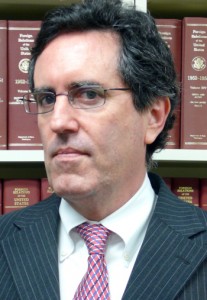
A NEW INTELLIGENCE ORG ON CLIMATE CHANGE IS NEEDED, DSB SAYS
The U.S. intelligence community needs an organization that can assess the impacts of climate change on U.S. national security interests in an open and collaborative manner, according to a new report from the Defense Science Board (DSB).
The Director of National Intelligence should establish a new intelligence group “to concentrate on the effects of climate change on political and economic developments and their implications for U.S. national security,” said the DSB report on “Trends and Implications of Climate Change for National and International Security” (large pdf).
The Central Intelligence Agency already has a Center on Climate Change and National Security. So why would the Intelligence Community need an entirely new organization to address the exact same set of issues?
One reason is that the role envisioned for the new organization is inconsistent with the practices of the CIA Center. So, for example, the new intelligence group would be expected to pursue cooperative relationships with others inside and outside of the U.S. government. It would also “report most of its products broadly within government and non-government communities,” the DSB report said.
But the CIA Center, by unspoken contrast, does not report any of its climate change products broadly or allow public access to them. (“At CIA, Climate Change is a Secret,” Secrecy News, September 22, 2011).
The CIA's unyielding approach to classification effectively negates the ability of its Center on Climate Change to interact with non-governmental organizations and researchers on an unclassified basis. Since, as the DSB noted, much of the relevant expertise on climate change lies “outside the government [in] universities, the private sector, and NGOs,” the CIA's blanket secrecy policy is a potentially disabling condition.
In fact, the DSB report said, the secretive approach favored by CIA is actually counterproductive.
“The most effective way to tackle understanding [climate change] may be to treat it, for the most part, as an open question, transparent to all engaged in its study,” the DSB report said. “Compartmentalizing climate change impact research can only hinder progress.”
Phi Beta Iota: Over the years Joe Markowitz, the only person in the secret world who actually has a clue about Open Source Intelligence (OSINT), has tried to insert useful words into Defense Science Board (DSB) reports. He helped conceptualize a defense-based and a diplomacy-based solution to the need for Whole of Government decision support that neither the existing Cabinet departments, nor the CIA, are capable of addressing. This new effort may be rooted in the frustration that DSB must feel from having both an Undersecretary of Defense for Intelligence and a Director of National Intelligence that are totally out of touch with reality, the needs of the government, or the public interest. They have both been captured by the intelligence-industrial complex that thrives on producing vapor-ware, and in the words of General Tony Zinni, USMC (Ret), produces, “at best” 4% of what a major commander needs, to which we would add, “and nothing for everyone else.”
See Also:
2004 Defense Science Board Report on Transitions to and from Hostilities
2004 Defense Science Board Report on Strategic Communication
2008 Rebalancing the Instruments of National Power (Full Text Online for Google Translate)
2008: Creating a Smart Nation (Full Text Online for Google Translate)
David Isenberg: Jim Clapper Claims Transformation — Robert Steele Comments on Each Misrepresentation
Defense Science Board to DoD: Get Brain + RECAP
Mini-Me: Doug Naquin Lies to Associated Press + RECAP
Open Source Agency: Executive Access Point



